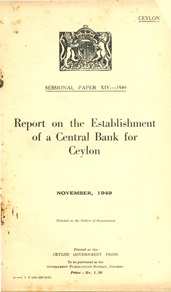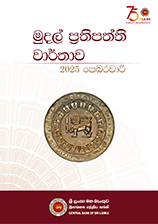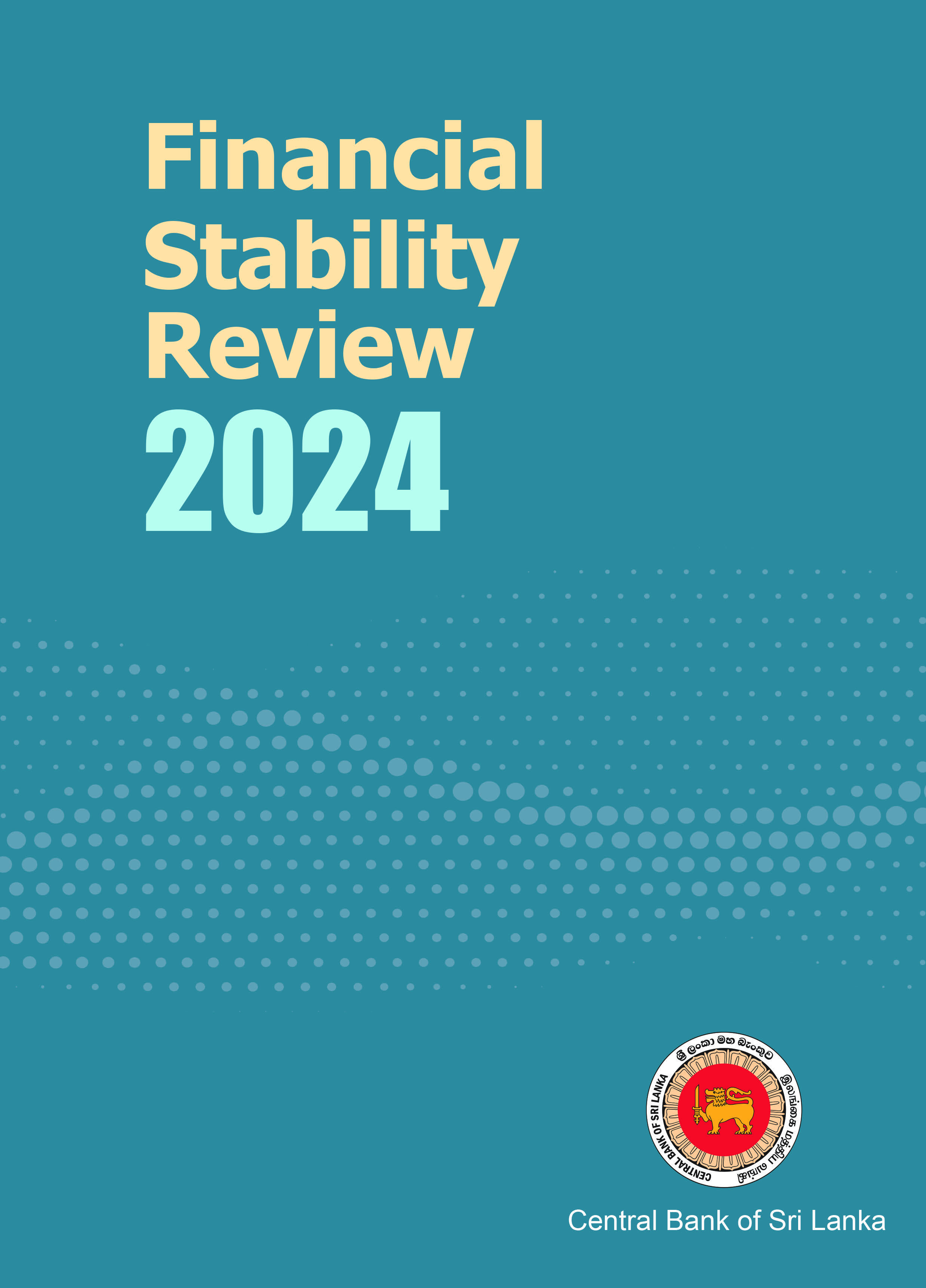මූල්ය පද්ධති ස්ථායීතා කමිටුව
මූල්ය පද්ධති ස්ථායිතාව සුරක්ෂිත කිරීම යනු 2023 අංක 16 දරන ශ්රී ලංකා මහ බැංකු පනතේ නියම කර ඇති ශ්රී ලංකා මහ බැංකුවේ අරමුණකි. මෙම අරමුණ මූල්ය පද්ධතියේ සංවර්ධනය සහ කාර්යක්ෂමතාව යන අන්යෝන්ය කරුණු සැලකිල්ලට ගනිමින් ක්රියාත්මක කළ යුතු වේ. මූල්ය පද්ධති ස්ථායීතා කමිටුව (FSSC) මූල්ය පද්ධතියේ මතුවන අවදානම් පිළිබඳ පරිපූර්ණ දෘෂ්ටියක් සහිත ව මෙම අරමුණ ඉටුකර ගැනීම සඳහා සාමූහික ප්රයත්න දරනු ඇතැයි අපේක්ෂා කෙරේ.
සාමාජිකයින් සහ අනෙකුත් පාර්ශ්වකරුවන් විසින් ඉස්මතු කරන ලද මූල්ය පද්ධති ස්ථායිතාව සම්බන්ධ අංශ තක්සේරු කිරීම සහ මූල්ය පද්ධතියේ අවදානම් අධීක්ෂණය කිරීම සහ සාමාජිකයින් විසින් සපයනු ලබන තාක්ෂණික යෙදවුම් මත පදනම් ව එවැනි අවදානම් අවම කිරීම සඳහා පාලක මණ්ඩලයට නිර්දේශ ඉදිරිපත් කිරීම මූල්ය පද්ධති ස්ථායීතා කමිටුවේ ප්රධාන කාර්යභාරය වේ.
මෙම කාර්යභාරය ඉටු කිරීමේ දී, මූල්ය පද්ධති ස්ථායීතා කමිටුව විසින්:
- මූල්ය පද්ධතියේ ස්ථායිතාව සහ සමස්තයක් ලෙස මූල්ය පද්ධතිය සඳහා වන ඉදිරි දැක්ම තක්සේරු කිරීම
- මූල්ය ආයතනවල අන්තර් සම්බන්ධතාව ඇතුළු ව, වෙළෙඳපොළවල් සහ ආර්ථික සාධකවලින් පැන නගින පද්ධතිමය අවදානම් අධීක්ෂණය කිරීම
- මූල්ය පද්ධතියේ ස්ථායිතාව ශක්තිමත් කිරීම සහ රැක ගැනීමේ අරමුණින් ඕනෑ ම අවස්ථාවක අවශ්ය යැයි සැලකෙන ප්රතිපත්ති ක්රියාමාර්ග සහ ක්රියාමාර්ග සාකච්ඡා කිරීම, නිර්වචනය කිරීම සහ තෝරා ගැනීම;
- ශ්රී ලංකා මහ බැංකුවේ මූල්ය පද්ධති ස්ථායීතා විධානයට සහාය වීම සඳහා ප්රතිපත්තිමය ක්රියාමාර්ග සහ ක්රියාමාර්ග පිළිබඳ ව පාලක මණ්ඩලය වෙත බලය ලබා දීමේ දී නිර්දේශ කිරීම. මෙම නිර්දේශවලට, විශේෂයෙන් ම, සාර්ව විචක්ෂණතා ප්රතිපත්තිමය ක්රියාමාර්ග සහ පද්ධතිය පුරා ඇඟවුම් සහිත ක්ෂුද්ර විචක්ෂණතා නියාමන ක්රියාමාර්ග ඇතුළත් වේ.
මූල්ය පද්ධති ස්ථායීතා කමිටුවේ සංයුතිය පහත පරිදි ය,
සභාපති
මූල්ය පද්ධති ස්ථායිතාව භාර නියෝජ්ය අධිපති
සාමාජිකයන්
සාර්ව විචක්ෂණතා ප්රතිපත්තිය භාර නියෝජ්ය අධිපති
මිල ස්ථායිතාව භාර නියෝජ්ය අධිපති
සාර්ව විචක්ෂණතා අධ්යයන දෙපාර්තමේන්තුව භාර සහකාර අධිපති
බැංකු අධීක්ෂණ දෙපාර්තමේන්තුව භාර සහකාර අධිපති
බැංකු නොවන මූල්ය ආයතන අධීක්ෂණ දෙපාර්තමේන්තුව භාර සහකාර අධිපති
ආර්ථික පර්යේෂණ දෙපාර්තමේන්තුව භාර සහකාර අධිපති
තැන්පතු රක්ෂණ සහ නිරාකරණ දෙපාර්තමේන්තුව භාර සහකාර අධිපති
ගෙවීම් සහ පියවීම් දෙපාර්තමේන්තුව භාර සහකාර අධිපති
සාර්ව විචක්ෂණතා අධ්යයන අධ්යක්ෂ
බැංකු අධීක්ෂණ අධ්යක්ෂ
බැංකු නොවන මූල්ය ආයතන අධීක්ෂණ අධ්යක්ෂ
ආර්ථික පර්යේෂණ අධ්යක්ෂ
තැන්පතු රක්ෂණ සහ නිරාකරණ අධ්යක්ෂ
ගෙවීම් සහ පියවීම් අධ්යක්ෂ
මූල්ය පද්ධති ස්ථායිතා කමිටු ලේකම්:
සාර්ව විචක්ෂණතා අධ්යයන දෙපාර්තමේන්තුවේ නියෝජ්ය අධ්යක්ෂ
මූල්ය පද්ධති ස්ථායීතා කමිටුව අවම වශයෙන් මාස දෙකකට වරක් රැස්වේ. මෙම රැස්වීම්වල දී, සාමාජිකයින් මූල්ය පද්ධතියේ ස්ථායීතාවට අදාළ ගැටලු සහ සලකා බැලීම් පිළිබඳ ව අදාළ දෙපාර්තමේන්තු විසින් සකස් කරන ලද වාර්තා විශ්ලේෂණය කරයි. සාර්ව විචක්ෂණ සහ ක්ෂුද්ර විචක්ෂණ දර්ශක වැනි මූල්ය අංශයේ ස්ථායිතා දර්ශක අධීක්ෂණය කිරීම ඇතුළත් නිරීක්ෂණ මගින් මූල්ය පද්ධතියට ඇති අවදානම් හඳුනාගෙන මනිනු ලැබේ. මූල්ය පද්ධති ස්ථායිතා කමිටුව විසින් මෙම අවදානම් අවම කිරීමට සහ මූල්ය පද්ධතියේ ස්ථායිතාව පවත්වා ගැනීමට අවශ්ය ක්රියාමාර්ග සහ ප්රතිපත්ති පිළිබඳ නිර්දේශ ඉදිරිපත් කිරීම හෝ අනුමත කිරීම සිදු කරන අතර එවැනි නිර්දේශ පසුව අදාළ සාමාජික දෙපාර්තමේන්තු හරහා පාලක මණ්ඩලය වෙත ඉදිරිපත් කරනු ලැබේ.










